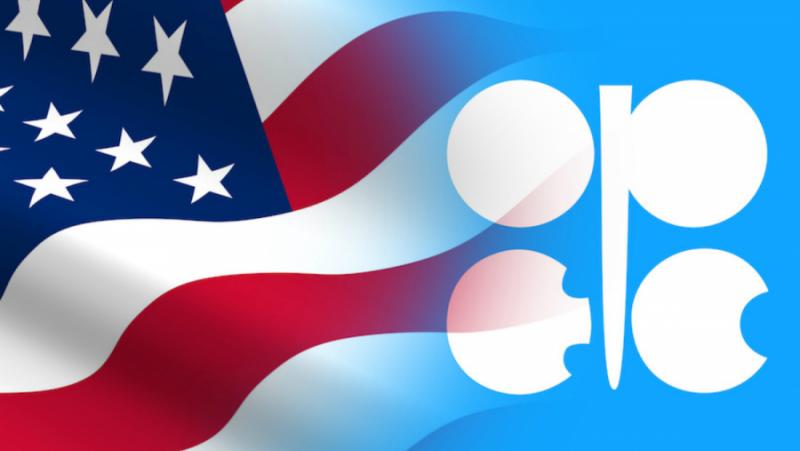Joe Biden persuades China to push oil prices together by printing out reserves. Washington is ready to agree to such an alliance after Russia and Saudi Arabia, within the framework of OPEC +, refused Biden to increase production outside the plan. Why are Americans so nervous about $ 80 oil, and will the United States have the strength to carry out its plans?
The United States has plans with China to lower oil prices by opening strategic reserves, unlike Russia and Saudi Arabia and the rest of OPEC +, which are raising quotas but slowly, keeping oil prices high.
US President Joe Biden has invited Chinese leader Xi Jinping to print some of the oil from strategic reserves. Energy supplies are an “urgent problem” for both China and the United States, with “energy departments on both sides discussing the details,” a source told the South China Morning Post. Beijing is generally open on this issue, but has not yet made specific commitments. China has told the United States that it must take into account its own domestic needs.
The strategic reserves of the United States are 727 million barrels of oil, China – about 200 million barrels. The release of some of these reserves could have a significant impact on world prices. The publication believes that Washington is likely to announce the release of reserves next week, even if Beijing does not support it.
Will the United States and China be able to unite to oppose the OPEC + cartel, which includes Russia and Saudi Arabia? Since the summer, the United States has been trying to put pressure on OPEC to actively increase oil production. However, at a regular meeting in early November, the cartel decided not to rush and to keep the existing plan to gradually increase production from its members.
Why are the US and China so nervous about oil over $ 80, when there were times for more expensive fuel after all? It is clear with China. China is the largest importer of oil and the cheaper it is, the better for the Chinese economy. “For China, like other net oil importers, high black gold prices are unprofitable primarily because they provoke cost inflation and slow economic growth. “Given the high debt burden of some sectors of the PRC economy, in particular the real estate sector, the slowdown in economic growth could lead to credit risks and an increase in insolvency cases,” said Anna Zaitseva, an analyst at FG Finam. .
“China is the world’s factory that needs energy. The more expensive the energy resources, the more expensive the production. This is reflected in rising prices, which leads to a decline in demand for the products of the “factory”, – says Vladimir Ananiev, an analyst at Exant.
Until recently, the United States was shouting about the shale revolution and securing hydrocarbons, but there is little left of the revolution. The president relies on green energy and does not support local oil and gas production. He is not in the least interested in how oil producers will survive, but he is worried about the rise in gasoline prices in the country and the acceleration of inflation. Because Joe Biden’s voters don’t like it.
“The increase in the price of oil leads to higher fuel prices at gas stations in the United States. This increases transport costs, and the consumer gets inflation on the shelves in the form of goods that have become more expensive, “said Ananiev.
“Rising oil prices have provoked a record acceleration in US inflation over the past 30 years, which reached 6.2% in October,” said Anna Zaitseva. Like China, the United States risks losing buyers due to too sharp a rise in prices.
“Fuel prices in the United States are approaching record levels. This has a negative effect on the approval rating of US President Biden. Such political pressure forces him to look for solutions or to pretend that we are looking, ”explains Alexander Kuptsikevich, a leading analyst at Efex Pro.
Washington can once again give the green light to shale projects and stop suppressing the oil industry with a green program. But as long as the Democrats are in power, this is unlikely to happen, Ananiev said.
Attempts by the United States to put pressure on OPEC + did not work, so Washington began talking about including oil reserves and even banning exports. Unlike the United States, which takes a long time to decide whether to print oil supplies or not, China is already doing so without the Americans. In fact, China began selling oil from strategic reserves as early as July in order to reduce fuel prices and support national refineries, and held its first public tender for oil in September.
The United States is hesitant, probably because it does not have so many oil reserves and simply will not be able to lower prices for a long time. This stock of 700 million barrels would be enough for just one month of life at the current level of daily consumption. At the same time, there is no talk of selling all the reserves.
With the launch of 15 to 48 million barrels of oil, prices should be expected to fall by two dollars per barrel and fall in gasoline prices in the US by 5-10 cents per gallon, said Stephen Nelly, head of information management at the Department of Energy. the country. According to him, the “scale of influence” of such a decision “will be relatively short” and may last only a few months.
Kuptsikevich agrees that these threats are not critical: earlier in September, we saw oil sales from US and Chinese reserves, and that was enough for just a few days, after which prices began to rise again. “Much more attention needs to be paid to the balance between supply and demand. “Mr Pazar is a much more effective player than the governments of the consumer countries,” he said. In addition, the reserves are not created for this at all.
“Oil stocks are needed for emergencies when there are supply disruptions. The current situation is not about emergencies: there is oil, it is just expensive, “said Ananiev.
It is possible that US threats will remain in words. Trying to find an ally in China may also be a manipulative game. Or Washington really believes that together they will be able to sustain falling oil prices for longer. And that they will wait for other factors to come that bring down the price of fuel. The fact is that at the beginning of next year an oil surplus is expected on the world oil market. “The latest data on stocks and production raise hopes that the point of balance between supply and demand is already close, if not already passed,” said Kupcikevich.
In addition, Iranian oil may soon be on the market. Negotiations on a nuclear deal with Tehran will resume in late November. If the United States lifts sanctions against Iran and Biden is clearly interested in that, then the Iranians will cut prices. If Europe is covered by a new wave of coronavirus, demand will fall, which will further increase the negative sentiment in the oil market, said Zaitseva. As a result, the United States will get what it wants – a lower price for oil and gasoline.
Here, OPEC + countries will have to think about what to do depending on price dynamics. “But it will not be possible for them to deal a critical blow to our income, as we have already compensated a lot. The average price of oil in 2021 is already over $ 70 per barrel, compared to $ 64 in 2019, which is already higher than before the coronavirus. And if we take into account the decline of the ruble from the end of 2019, then the budget has nothing to complain about, “said Ananiev. Russia has also accumulated reserves to record levels.
Translator: V. Sergeev
Become a friend of Pogled.info on facebook and recommend to your friends
–

